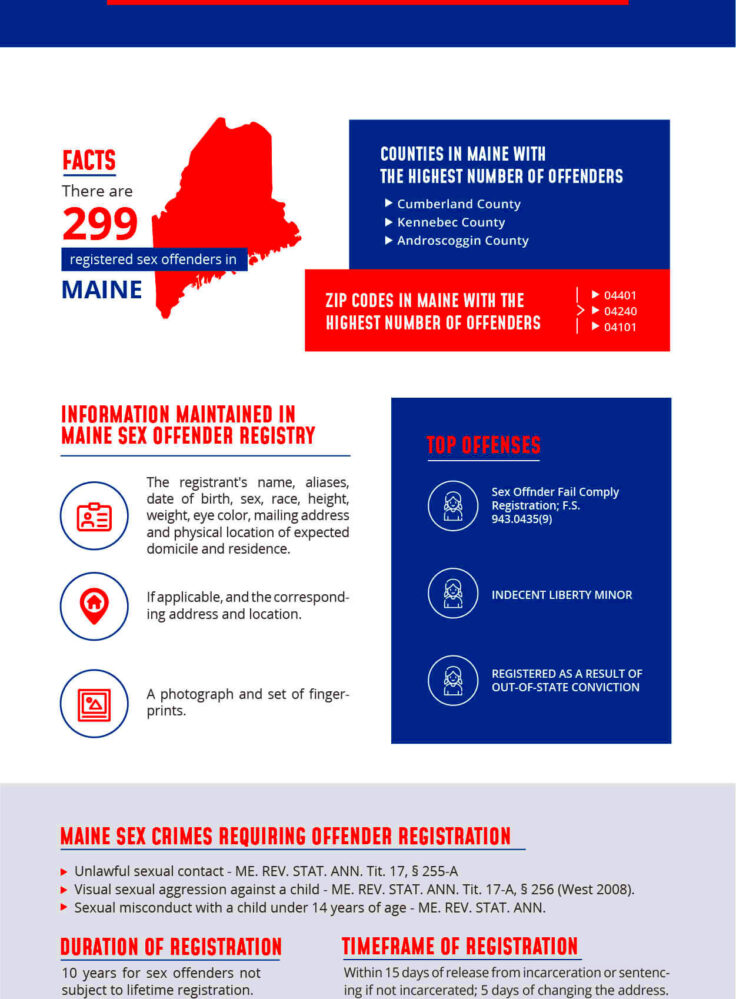Maine Sex Offender Laws Explained
Maine has strict laws when it comes to sex offender registration. If someone is convicted of certain sex crimes, they are required by law to register as a sex offender. This registration helps local authorities keep track of offenders and protect the public. Failing to register can result in serious consequences, including criminal penalties. Understanding the requirements and following them carefully is essential for anyone convicted of a sex offense in Maine.
In Maine, offenders must register within a set period, usually within 5 days of release from jail or after the sentencing date if no jail time is served. Registrants must provide specific details like their name, address, employment information, and vehicle details. They are also required to update this information if there are any changes, such as moving to a new address or changing jobs.
The length of time that someone must remain on the sex offender registry depends on the severity of the crime. Some individuals are required to register for a minimum of 10 years, while others may be listed for life. Failure to comply with these requirements can lead to further legal consequences.
Categories of Offenders Under Maine Law

Sex offenders in Maine are divided into different categories based on the nature of their crimes. These categories determine the length of time an offender must remain on the registry and the specific reporting requirements they must follow. Maine law primarily separates offenders into two main tiers:
- Tier I Offenders: These individuals have been convicted of less severe sex crimes, such as indecent exposure or certain forms of unlawful sexual contact. Tier I offenders are required to register for a minimum of 10 years.
- Tier II Offenders: These offenders have committed more serious offenses, such as sexual abuse of a minor or other violent sexual crimes. Tier II offenders are required to register for life.
There are also special conditions for juvenile offenders. Depending on the case, juvenile offenders may face different registration requirements or may be exempt from registration entirely if deemed appropriate by the court.
Legal Consequences for Failing to Register
Failing to comply with Maine’s sex offender registration laws is a serious offense. If an offender does not register or fails to update their information as required, they can face criminal charges. The penalties vary depending on the circumstances of the failure.
Here are some potential legal consequences:
- Misdemeanor Charges: First-time offenders who fail to register may be charged with a misdemeanor, which could result in fines and jail time.
- Felony Charges: Repeat offenders or those who willfully avoid registration may face felony charges, which carry harsher penalties, including longer prison sentences.
- Additional Registration Time: In some cases, failure to register can result in an extension of the registration period, meaning the offender must remain on the registry for a longer duration.
In addition to legal penalties, failing to register can severely impact an individual’s personal and professional life, including their ability to find housing or employment.
Restrictions Imposed on Registered Sex Offenders
Being on Maine’s sex offender registry comes with significant restrictions that affect various aspects of a person’s life. These restrictions are designed to protect the community, particularly vulnerable groups like children, from potential harm. It’s important for registered offenders to understand these limitations to avoid further legal issues.
Some common restrictions include:
- Residence Restrictions: Many registered sex offenders cannot live within a certain distance of schools, parks, or daycare centers. These buffer zones ensure that offenders do not reside near places where children gather.
- Employment Restrictions: Certain jobs, especially those involving direct contact with minors or vulnerable adults, are off-limits to registered sex offenders. This includes jobs in schools, childcare facilities, and healthcare settings.
- Travel Restrictions: Registered sex offenders must notify authorities if they plan to leave the state or travel for extended periods. Failing to do so can result in penalties.
- Internet Usage: Some offenders, especially those convicted of internet-based sex crimes, may face restrictions on their use of the internet or social media platforms.
These restrictions can last for the entire period that a person remains on the registry, and violating any of them can result in additional criminal charges. Registered offenders must always be aware of the specific terms of their restrictions to stay compliant with the law.
Can a Sex Offender Be Removed from the Registry?
In Maine, it is possible for certain sex offenders to be removed from the registry, but it depends on the nature of the crime and the length of time since the conviction. The process is not automatic and requires court approval. If eligible, individuals can petition the court to be removed from the sex offender registry after serving a designated amount of time.
Here are some key points about the removal process:
- Eligibility Criteria: In general, individuals convicted of less severe offenses, such as those classified under Tier I, may be eligible for removal after 10 years. However, those convicted of more serious crimes (Tier II) may not be eligible for removal.
- Good Behavior Requirement: The offender must demonstrate a long period of compliance with the law, showing no further criminal activity, particularly any sex-related crimes.
- Court Review: The petition for removal is reviewed by a judge, who considers various factors, including the nature of the original offense, the individual’s conduct since then, and any potential risk to public safety.
It is important to note that being removed from the registry does not erase the original conviction; it only removes the individual from the list of registered offenders. Consulting a lawyer can help offenders understand their options for petitioning for removal.
Impact of Maine Sex Offender Laws on Employment
Sex offender registration can have a profound impact on an individual’s ability to find and maintain employment. Employers often perform background checks, and being listed on the sex offender registry can raise significant concerns, particularly in jobs involving vulnerable populations, such as children or the elderly.
Here are some ways Maine’s sex offender laws affect employment opportunities:
- Restricted Jobs: Sex offenders are barred from working in schools, childcare centers, and healthcare facilities. These restrictions apply to jobs that involve direct contact with children or other vulnerable groups.
- Licensing Issues: Many professional licenses, such as those for teaching, healthcare, or social work, may be revoked or denied to registered sex offenders. This can severely limit career options.
- Background Checks: Most employers conduct background checks, and a sex offense conviction will appear on those checks. This can lead to difficulty securing jobs, even in industries without direct restrictions.
Despite these challenges, it is possible for registered offenders to find work. Some industries, such as construction, manufacturing, or certain remote jobs, may be more open to hiring individuals on the registry. However, individuals must be honest with potential employers about their status and adhere to any legal restrictions related to their employment.
- How often do registered offenders need to update their information?
In Maine, offenders must update their registration details within five days of any changes, such as moving to a new address, changing jobs, or obtaining a new vehicle. - Can juveniles be placed on the sex offender registry?
Yes, but it depends on the case. In some instances, juvenile offenders may be required to register, while in others, they may be exempt or face different registration rules. - What happens if a sex offender moves to another state?
If a registered offender moves out of Maine, they are required to notify the authorities in Maine as well as register in their new state. Failing to do so can lead to further penalties. - Is it possible to be removed from the registry?
In some cases, individuals may be eligible for removal from the registry after a designated period, particularly those convicted of less serious crimes. However, this requires court approval.


